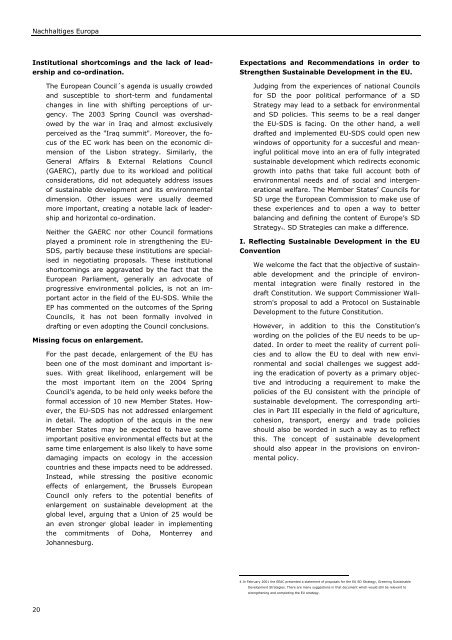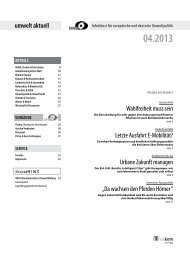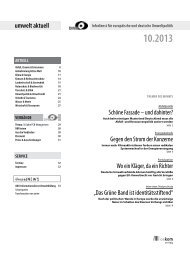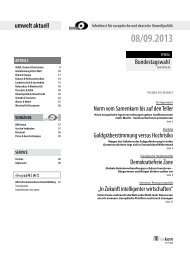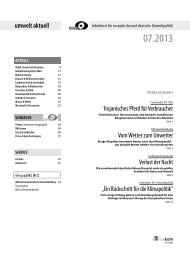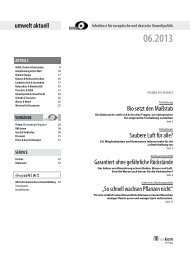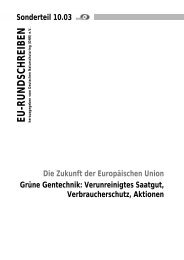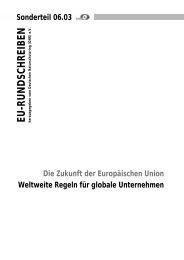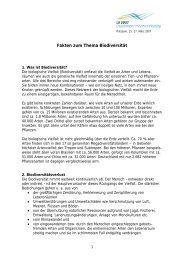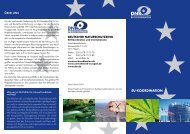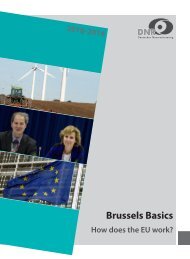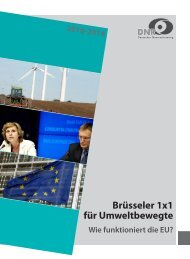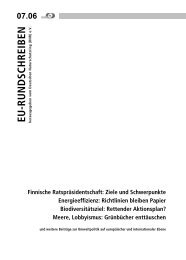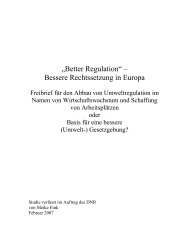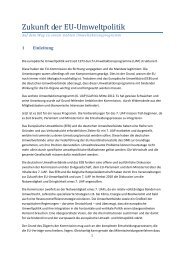Nachhaltiges Europa Abschlusspublikation - Global Marshall Plan
Nachhaltiges Europa Abschlusspublikation - Global Marshall Plan
Nachhaltiges Europa Abschlusspublikation - Global Marshall Plan
Sie wollen auch ein ePaper? Erhöhen Sie die Reichweite Ihrer Titel.
YUMPU macht aus Druck-PDFs automatisch weboptimierte ePaper, die Google liebt.
<strong>Nachhaltiges</strong> <strong>Europa</strong><br />
Institutional shortcomings and the lack of lead-<br />
ership and co-ordination.<br />
20<br />
The European Council´s agenda is usually crowded<br />
and susceptible to short-term and fundamental<br />
changes in line with shifting perceptions of urgency.<br />
The 2003 Spring Council was overshadowed<br />
by the war in Iraq and almost exclusively<br />
perceived as the "Iraq summit". Moreover, the focus<br />
of the EC work has been on the economic dimension<br />
of the Lisbon strategy. Similarly, the<br />
General Affairs & External Relations Council<br />
(GAERC), partly due to its workload and political<br />
considerations, did not adequately address issues<br />
of sustainable development and its environmental<br />
dimension. Other issues were usually deemed<br />
more important, creating a notable lack of leadership<br />
and horizontal co-ordination.<br />
Neither the GAERC nor other Council formations<br />
played a prominent role in strengthening the EU-<br />
SDS, partly because these institutions are specialised<br />
in negotiating proposals. These institutional<br />
shortcomings are aggravated by the fact that the<br />
European Parliament, generally an advocate of<br />
progressive environmental policies, is not an im-<br />
portant actor in the field of the EU-SDS. While the<br />
EP has commented on the outcomes of the Spring<br />
Councils, it has not been formally involved in<br />
drafting or even adopting the Council conclusions.<br />
Missing focus on enlargement.<br />
For the past decade, enlargement of the EU has<br />
been one of the most dominant and important issues.<br />
With great likelihood, enlargement will be<br />
the most important item on the 2004 Spring<br />
Council’s agenda, to be held only weeks before the<br />
formal accession of 10 new Member States. However,<br />
the EU-SDS has not addressed enlargement<br />
in detail. The adoption of the acquis in the new<br />
Member States may be expected to have some<br />
important positive environmental effects but at the<br />
same time enlargement is also likely to have some<br />
damaging impacts on ecology in the accession<br />
countries and these impacts need to be addressed.<br />
Instead, while stressing the positive economic<br />
effects of enlargement, the Brussels European<br />
Council only refers to the potential benefits of<br />
enlargement on sustainable development at the<br />
global level, arguing that a Union of 25 would be<br />
an even stronger global leader in implementing<br />
the commitments of Doha, Monterrey and<br />
Johannesburg.<br />
Expectations and Recommendations in order to<br />
Strengthen Sustainable Development in the EU.<br />
Judging from the experiences of national Councils<br />
for SD the poor political performance of a SD<br />
Strategy may lead to a setback for environmental<br />
and SD policies. This seems to be a real danger<br />
the EU-SDS is facing. On the other hand, a well<br />
drafted and implemented EU-SDS could open new<br />
windows of opportunity for a succesful and meaningful<br />
political move into an era of fully integrated<br />
sustainable development which redirects economic<br />
growth into paths that take full account both of<br />
environmental needs and of social and intergenerational<br />
welfare. The Member States’ Councils for<br />
SD urge the European Commission to make use of<br />
these experiences and to open a way to better<br />
balancing and defining the content of Europe’s SD<br />
Strategy4. SD Strategies can make a difference.<br />
I. Reflecting Sustainable Development in the EU<br />
Convention<br />
We welcome the fact that the objective of sustain-<br />
able development and the principle of environmental<br />
integration were finally restored in the<br />
draft Constitution. We support Commissioner Wall-<br />
strom's proposal to add a Protocol on Sustainable<br />
Development to the future Constitution.<br />
However, in addition to this the Constitution’s<br />
wording on the policies of the EU needs to be updated.<br />
In order to meet the reality of current policies<br />
and to allow the EU to deal with new envi-<br />
ronmental and social challenges we suggest adding<br />
the eradication of poverty as a primary objective<br />
and introducing a requirement to make the<br />
policies of the EU consistent with the principle of<br />
sustainable development. The corresponding articles<br />
in Part III especially in the field of agriculture,<br />
cohesion, transport, energy and trade policies<br />
should also be worded in such a way as to reflect<br />
this. The concept of sustainable development<br />
should also appear in the provisions on environ-<br />
mental policy.<br />
4 In February 2001 the EEAC presented a statement of proposals for the EU SD Strategy, Greening Sustainable<br />
Development Strategies. There are many suggestions in that document which would still be relevant to<br />
strengthening and completing the EU strategy.


